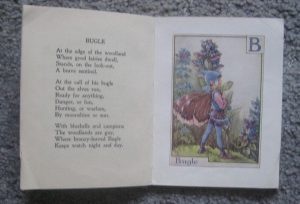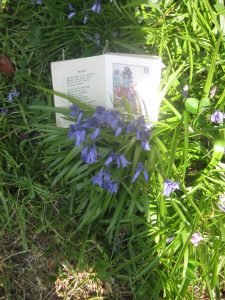
This year the gardens, hedgerows and Devon lanes have been covered with an abundance of bluebells. Not all of them have been native bluebells (or harebells as they are known in Scotland), <https://en.wikipedia.org/wiki/Hyacinthoides_non-scripta> but their stained glass window bright blue has added a dash of vibrant colour to many ‘lock down’ walks.
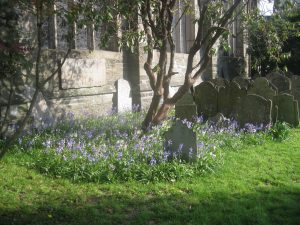
St. Eustachius, Tavistock, Devon
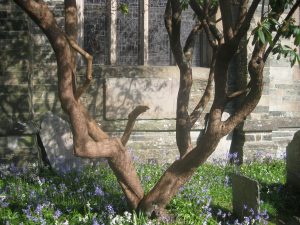
St. Eustachius, Tavistock
Bluebell woods, with their violet blue carpet of flowers are so striking that it is interesting that they have featured less in poetry and literature than many other wildflowers. They do feature in a children’s game <http://the-history-girls.blogspot.com/2019/05/in-and-out-dusty-bluebells-by-karen.html>.
The history, legends and myths associated with bluebells are discussed in an excellent article by Karen Maitland <http://the-history-girls.blogspot.com/2019/05/in-and-out-dusty-bluebells-by-karen.html>.
Illustration and poem by Margaret Tarrant
Bluebells are mentioned in a short poem ‘Bugle’ in A Flower Fairy Alphabet by the illustrator Margaret Tarrant <https://en.wikipedia.org/wiki/Margaret_Tarrant> and https://flowerfairies.com/the-bluebell-fairy/
The name has also been used for characters such as Bluebell https://watershipdown.fandom.com/wiki/Bluebell
The Brontës obviously were enchanted by bluebells, because two of the sisters were inspired to write poems about them <https://allpoetry.com/poem/8457985-The-Bluebell-by-Anne-Bronte>
The Bluebell (Anne Brontë)
‘A fine and subtle spirit dwells
In every little flower,
Each one its own sweet feeling breathes
With more or less of power.
There is a silent eloquence
In every wild bluebell
That fills my softened heart with bliss
That words could never tell.
Yet I recall not long ago
A bright and sunny day,
‘Twas when I led a toilsome life
So many leagues away;
That day along a sunny road
All carelessly I strayed,
Between two banks where smiling flowers
Their varied hues displayed.
Before me rose a lofty hill,
Behind me lay the sea,
My heart was not so heavy then
As it was wont to be.
Less harassed than at other times
I saw the scene was fair,
And spoke and laughed to those around,
As if I knew no care.
But when I looked upon the bank
My wandering glances fell
Upon a little trembling flower,
A single sweet bluebell.
Whence came that rising in my throat,
That dimness in my eye?
Why did those burning drops distil —
Those bitter feelings rise?
O, that lone flower recalled to me
My happy childhood’s hours
When bluebells seemed like fairy gifts
A prize among the flowers,
Those sunny days of merriment
When heart and soul were free,
And when I dwelt with kindred hearts
That loved and cared for me.
I had not then mid heartless crowds
To spend a thankless life
In seeking after others’ weal
With anxious toil and strife.
‘Sad wanderer, weep those blissful times
That never may return!’
The lovely floweret seemed to say,
And thus it made me mourn.’
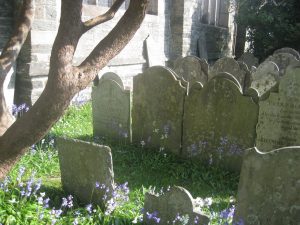
The Blue Bell (Emily Brontë) < https://en.wikipedia.org/wiki/Emily_Bront%C3%AB>
‘The blue bell is the sweetest flower
That waves in summer air;
Its blossoms have the mightiest power
To soothe my spirit’s care.
There is a spell in purple heath
Too wildly, sadly dear;
The violet has a fragrant breath
But fragrance will not cheer.
The trees are bare, the sun is cold;
And seldom, seldom seen;
The heavens have lost their zone of gold
The earth its robe of green;
And ice upon the glancing stream
Has cast its sombre shade
And distant hills and valleys seem
In frozen mist arrayed –
The blue bell cannot charm me now
The heath has lost its bloom,
The violets in the glen below
They yield no sweet perfume.
But though I mourn the heather-bell
‘Tis better far, away;
I know how fast my tears would swell
To see it smile today;
And that wood flower that hides so shy
Beneath the mossy stone
Its balmy scent and dewy eye:
‘Tis not for them I moan.
It is the slight and stately stem,
The blossom’s silvery blue,
The buds hid like a sapphire gem
In sheaths of emerald hue.
‘Tis these that breathe upon my heart
A calm and softening spell
That if it makes the tear-drop start
Has power to soothe as well.
For these I weep, so long divided
Through winter’s dreary day,
In longing weep–but most when guided
On withered banks to stray.
If chilly then the light should fall
Adown the dreary sky
And gild the dank and darkened wall
With transient brilliancy,
How do I yearn, how do I pine
For the time of flowers to come,
And turn me from that fading shine
To mourn the fields of home –’
In Devon the bluebells are gradually disappearing to be replaced by golden buttercups and sunshine yellow dandelions, but for some the bluebell has held a special and lasting place in their hearts like Gerard Manley Hopkins who wrote, “I do not think I have ever seen anything more beautiful than the bluebell I have been looking at. I know the beauty of our Lord by it” and for Paul McCartney whose last words to his wife Linda are recorded as having been, “You’re up on your beautiful Appaloosa stallion. It’s a fine spring day. We’re riding through the woods. The bluebells are all out, and the sky is clear-blue”< https://www.azquotes.com/quotes/topics/bluebells.html>.
